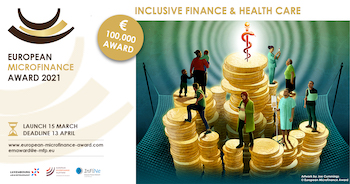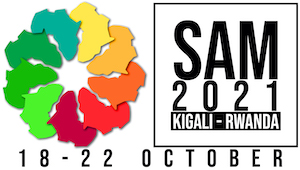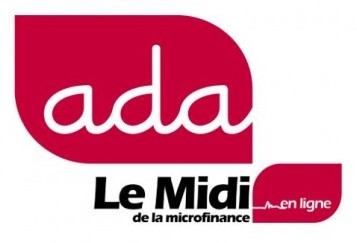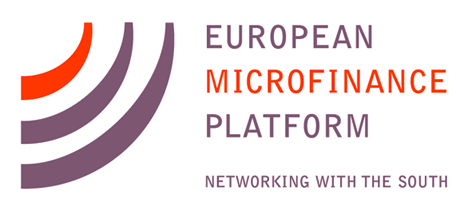The  3Zero World Forum will connect professionals in various fields as well as interested citizens in an “exchange and sharing of solutions” with respect to the “3Zero” objective: zero exclusion, zero carbon and zero poverty. The agenda is to cover areas such as “Transforming Economic Models and Organisations Towards a 3Zero World” and
3Zero World Forum will connect professionals in various fields as well as interested citizens in an “exchange and sharing of solutions” with respect to the “3Zero” objective: zero exclusion, zero carbon and zero poverty. The agenda is to cover areas such as “Transforming Economic Models and Organisations Towards a 3Zero World” and
Category: Events
SPECIAL REPORT: European Microfinance Week 2021 to Be Fully Online
From  the European Microfinance Platform (e-MFP): The past 15 months have been very challenging, and during this time we at e-MFP have engaged with our members and friends and adapted our activities accordingly to best mitigate the effects this pandemic brings to our sector and the vulnerable people we as a community serve.
the European Microfinance Platform (e-MFP): The past 15 months have been very challenging, and during this time we at e-MFP have engaged with our members and friends and adapted our activities accordingly to best mitigate the effects this pandemic brings to our sector and the vulnerable people we as a community serve.
One of our flagship activities is European Microfinance Week – held annually in November – and while it is difficult to predict the progression of the pandemic, it remains likely that travel restrictions will still apply in the coming months and that participants from the global South will be
SPECIAL REPORT: SAM 2021 to Take Place in Kigali, Rwanda, October 18-22; “One Is Not Born Resilient But Becomes Resilient: Fostering Inclusive Finance to Better Overcome Crisis!”
From  ADA: It’s official! The largest event in inclusive finance on the African continent, the long awaited African Microfinance Week (AMW 2021), will take place in Kigali, in the land of 1,000 hills and mountains: Rwanda. From October 18 to October 22, 2021, the SAM will address the theme of resilience, a concern that is all the more important in these particular times.
ADA: It’s official! The largest event in inclusive finance on the African continent, the long awaited African Microfinance Week (AMW 2021), will take place in Kigali, in the land of 1,000 hills and mountains: Rwanda. From October 18 to October 22, 2021, the SAM will address the theme of resilience, a concern that is all the more important in these particular times.
This notice is the first in a
SPECIAL REPORT: Online Event; COVID-19 Surveys: Better Understanding the Impact on MFIs and Their Clients to Better Act; June 9, 2021
Two  Luxembourg-based NGOs, ADA Microfinance and Grameen Crédit Agricole Foundation, along with Belgium-based Inpulse Investment Manager will present their analysis of the responses to five surveys they have conducted since 2020 regarding how the COVID-19 pandemic is affecting microfinance institutions (MFIs). This event, part of the Midi de la Microfinance series, will offer “lessons learned” from the surveys, with the goal of helping MFIs improve the ways they prepare for and react to crises. Among the speakers will be Jacques Afetor, Director of Togo-based
Luxembourg-based NGOs, ADA Microfinance and Grameen Crédit Agricole Foundation, along with Belgium-based Inpulse Investment Manager will present their analysis of the responses to five surveys they have conducted since 2020 regarding how the COVID-19 pandemic is affecting microfinance institutions (MFIs). This event, part of the Midi de la Microfinance series, will offer “lessons learned” from the surveys, with the goal of helping MFIs improve the ways they prepare for and react to crises. Among the speakers will be Jacques Afetor, Director of Togo-based
MICROFINANCE EVENT: FinovateSpring; May 18-20, 2022; San Francisco, California, USA
FinovateSpring is one of a series of conferences focusing on financial technology (fintech). The event is scheduled to include demonstrations of new fintech products, networking opportunities and approximately 175 speakers, with a focus on
SPECIAL REPORT: Apply/Postulez/Postular – European Microfinance Award 2021
From  the European Microfinance Platform (e-MFP): The €100,000 European Microfinance Award 2021 on ‘Inclusive Finance and Health Care’ highlights the crucial role the inclusive finance sector can play in helping low-income and excluded populations both plan day-to-day medical spending and ‘smooth’ out health-related financial shocks.
the European Microfinance Platform (e-MFP): The €100,000 European Microfinance Award 2021 on ‘Inclusive Finance and Health Care’ highlights the crucial role the inclusive finance sector can play in helping low-income and excluded populations both plan day-to-day medical spending and ‘smooth’ out health-related financial shocks.
If you are
MICROFINANCE EVENT: FinovateFall; September 13-15, 2021; New York, New York, USA
FinovateFall is one of a series of conferences focusing on financial technology (fintech). The event includes demonstrations of new fintech products, networking opportunities and approximately 120 speakers. Although the agenda for this year has yet to be announced, the 2020 agenda included sessions such as Keynote presentations by Pablos Holman, inventor at the Intellectual Ventures Lab; Sarika Sangwan, Global Head of strategy and marketing at Pinterest; and a panel discussion of post-Covid innovation. Details regarding an option to participate virtually are under development.
SPECIAL REPORT: European Microfinance Week Closes, Looking to Future of Financial Inclusion: Wooing Regulators, Women Leveraging Loans by Factor of 5, Investor Collaboration, New Customers for MFIs
Claudio  Gonzalez-Vega, a board member of Spain’s BBVA Microfinance Foundation, spoke of the huge impact of the COVID-19 pandemic at the closing plenary of European Microfinance Week, with life expectancy falling and an estimated 115 million people being pushed into extreme poverty. Despite the difficulties for microfinance institutions (MFIs), he said they may soon find a larger, very appropriate market for their services, given that many of these newly poor people have business experience. Dr Gonzalez-Vega argued that the “pandemic will make microfinance more important,” as – given MFIs’ “intimate knowledge of clients – the role of microfinance will be appreciated in a new light.”
Gonzalez-Vega, a board member of Spain’s BBVA Microfinance Foundation, spoke of the huge impact of the COVID-19 pandemic at the closing plenary of European Microfinance Week, with life expectancy falling and an estimated 115 million people being pushed into extreme poverty. Despite the difficulties for microfinance institutions (MFIs), he said they may soon find a larger, very appropriate market for their services, given that many of these newly poor people have business experience. Dr Gonzalez-Vega argued that the “pandemic will make microfinance more important,” as – given MFIs’ “intimate knowledge of clients – the role of microfinance will be appreciated in a new light.”
Dina Pons of Belgium’s Incofin Investment Management agreed that microfinance clients have gotten
SPECIAL REPORT: Financial Inclusion for Forcibly Displaced Persons (FDPs) – Part 2: Regulatory Barriers, Segmenting Needs
(This  is the companion feature to an earlier piece on a European Microfinance Week conversation on serving refugees.)
is the companion feature to an earlier piece on a European Microfinance Week conversation on serving refugees.)
Swati Mehta Dhawan of Germany’s Catholic University of Eichstätt-Ingolstadt argued for building up legal frameworks to allow forcibly displaced persons (FDPs) to escape “infinite limbo” by accessing documentation for identification purposes, working legally and integrating with host populations. She offered the example of a person displaced to Kenya, who has been there for 15 years without being allowed to work. Hans-Martin Zademach, also of Catholic University, noted many are “stuck in survival mode,” more in need of a reliable income source than methods for managing money.
However, Ms Dhawan explained that FDPs’ needs for financial services often increase as years go by. A common trajectory is
SPECIAL REPORT: Strong Motivation to Save, “Extreme Resilience During Times of Crisis” Despite Microfinance Institutions’ “Smothering” Loan Offers Pre-pandemic
During  the plenary titled “Creating an Environment for Effective and Inclusive Savings” on day two of European Microfinance Week, Stuart Rutherford of the Hrishipara Daily Diaries Project suggested thinking of savings as two separate services – collection and storage. While storage is primary for a person with regular paychecks deposited into a bank electronically, collection is critical for cash earners. This is why the service of a susu worker, who collects deposits frequently door-to-door and then returns “withdrawals” periodically, is so valuable that people are willing to pay fees for it.
the plenary titled “Creating an Environment for Effective and Inclusive Savings” on day two of European Microfinance Week, Stuart Rutherford of the Hrishipara Daily Diaries Project suggested thinking of savings as two separate services – collection and storage. While storage is primary for a person with regular paychecks deposited into a bank electronically, collection is critical for cash earners. This is why the service of a susu worker, who collects deposits frequently door-to-door and then returns “withdrawals” periodically, is so valuable that people are willing to pay fees for it.
Luis Treviño Garza of the Alliance for Financial Inclusion noted that savings is an “important factor for resilience, especially for vulnerable groups.” He added that “from the regulator’s perspective savings is really crucial… above credit.”
Mr Rutherford said that “all the diaries I’ve [collected in Bangladesh] show that poor people have a strong propensity to
SPECIAL REPORT: Digitizing Microfinance – Silver Lining of the Pandemic?
Ciprian  Panturu of Belgium-based cooperative PHB Development opened a European Microfinance Week session on financial services providers (FSPs) moving toward digital services with a joke: “Who got the FSP to ‘go digital,’ the CEO, the CFO?” The answer, of course, is “COVID!”. Unlike before the pandemic, when FSPs were looking into digital services and clients were often unconvinced, Mr Panturu said, “Now there is a clear pull from the customer side.”
Panturu of Belgium-based cooperative PHB Development opened a European Microfinance Week session on financial services providers (FSPs) moving toward digital services with a joke: “Who got the FSP to ‘go digital,’ the CEO, the CFO?” The answer, of course, is “COVID!”. Unlike before the pandemic, when FSPs were looking into digital services and clients were often unconvinced, Mr Panturu said, “Now there is a clear pull from the customer side.”
Jessica Schicks of the Belgian Investment Company for Developing Countries (BIO) agreed, “Client uptake has been a challenge in past. COVID is helping overcome digital literacy and trust issues.” However, she warned,
SPECIAL REPORT: Lessons, Tools for the Pandemic from Prior Microfinance Crises
Deborah  Drake of Accion’s CFI opened a European Microfinance Week session on crises in microfinance by noting that the effect of COVID-19 on the financial inclusion industry “is a different crisis because it is global.” In past crises, which were centered on a single economy, microfinance investors had sufficient capacity to inject into stronger institutions to help them survive. The global nature of the current downturn, however, may exceed the capacity of investors to sustain “worthy” financial services providers (FSPs) in certain markets. “There is inevitable
Drake of Accion’s CFI opened a European Microfinance Week session on crises in microfinance by noting that the effect of COVID-19 on the financial inclusion industry “is a different crisis because it is global.” In past crises, which were centered on a single economy, microfinance investors had sufficient capacity to inject into stronger institutions to help them survive. The global nature of the current downturn, however, may exceed the capacity of investors to sustain “worthy” financial services providers (FSPs) in certain markets. “There is inevitable
SPECIAL REPORT: During Pandemic, VSLAs Support Members Struggling with Barriers to Income, Education, Gender-based Violence, Lack of PPE
During  a European Microfinance Week session on village savings and loan associations (VSLAs), speakers from several affiliates of Switzerland-based CARE International described their organizations’ responses to the COVID-19 pandemic. As the pandemic set in, they surveyed members of VSLAs, which commonly include 30 women, in various formats to learn how they were adjusting to the pandemic and what support they need.
a European Microfinance Week session on village savings and loan associations (VSLAs), speakers from several affiliates of Switzerland-based CARE International described their organizations’ responses to the COVID-19 pandemic. As the pandemic set in, they surveyed members of VSLAs, which commonly include 30 women, in various formats to learn how they were adjusting to the pandemic and what support they need.
Maryam Garba Usman of CARE Nigeria described her organization’s survey of 100 VSLAs, largely via an interactive voice response telephone system. The team also used a mobile app to distribute information on COVID-19 and a range of gender-related issues. Most groups continued to meet in person, incorporating social distancing. In addition to accessing financial services, VSLA members addressed problems such as gender-based violence, child marriage, interruptions to children’s education and
SPECIAL REPORT: Lessons from Giving Away, Selling Microinsurance with Remittances
As  part of the ongoing search for models that can make microinsurance profitable, the Luxembourg-based nonprofit ADA partnered with UAE-based insurtech Democrance to sell policies to migrant workers in Dubai as they send money to family in their home countries. The incentive for remittance providers to participate is that the draw of microinsurance can increase their customer base and allow differentiation from competitors.
part of the ongoing search for models that can make microinsurance profitable, the Luxembourg-based nonprofit ADA partnered with UAE-based insurtech Democrance to sell policies to migrant workers in Dubai as they send money to family in their home countries. The incentive for remittance providers to participate is that the draw of microinsurance can increase their customer base and allow differentiation from competitors.
The target population is migrants from India and the Philippines, who are generally tech savvy and aged 25 to 45 years old. Most workers earn up to AED 4,000 (USD 1,100) per month and send about a quarter of that amount home. Rise, a UAE-based facilitator of financial services to migrants, enrolled 1,000 customers by
SPECIAL REPORT: Protecting Consumers, Tracking Business Cash Flows, Cutting Costs for Digital Microfinance
During  a session entitled “Digital Credit Beyond Consumer Finance” at European Microfinance Week 2020, Michael Rothe, the co-founder of UK-based Flow, argued that there are both good and bad players in digital lending. He said that “most development finance institutions think digital credit is dangerous” and that “because providers are not being differentiated, Flow is being lumped in with” consumer finance. In fact, Flow is a fintech that lends to businesses only. During the COVID-19 pandemic, some Flow customers – many of whom operate shops that offer mobile-money services as a sideline – had to close down due to government restrictions on travel and trade. However, those that remained open saw an uptick in transactions. This is partially because governments encouraged the use of mobile money in an effort to minimize virus transmission. While other lenders stopped operating during the early days of the pandemic, Flow continued to lend, resulting in brand loyalty that Mr Rothe describes as very high. The ratio of the firm’s portfolio at risk peaked at
a session entitled “Digital Credit Beyond Consumer Finance” at European Microfinance Week 2020, Michael Rothe, the co-founder of UK-based Flow, argued that there are both good and bad players in digital lending. He said that “most development finance institutions think digital credit is dangerous” and that “because providers are not being differentiated, Flow is being lumped in with” consumer finance. In fact, Flow is a fintech that lends to businesses only. During the COVID-19 pandemic, some Flow customers – many of whom operate shops that offer mobile-money services as a sideline – had to close down due to government restrictions on travel and trade. However, those that remained open saw an uptick in transactions. This is partially because governments encouraged the use of mobile money in an effort to minimize virus transmission. While other lenders stopped operating during the early days of the pandemic, Flow continued to lend, resulting in brand loyalty that Mr Rothe describes as very high. The ratio of the firm’s portfolio at risk peaked at
SPECIAL REPORT: Local Market Data, Resilience During Pandemic, Securitization, Land Title Systems Enable Housing Microfinance, Micro-mortgages
During  European Microfinance Week 2020, Maria Claudia Rojas of the Netherlands’ Triple Jump described her firm’s experience managing the MicroBuild Fund it created with US-based Habitat for Humanity in 2012. Compared with Triple Jump’s portfolio as a whole, MicroBuild has maintained higher asset quality, and that margin of superiority has doubled during the COVID-19 pandemic.
European Microfinance Week 2020, Maria Claudia Rojas of the Netherlands’ Triple Jump described her firm’s experience managing the MicroBuild Fund it created with US-based Habitat for Humanity in 2012. Compared with Triple Jump’s portfolio as a whole, MicroBuild has maintained higher asset quality, and that margin of superiority has doubled during the COVID-19 pandemic.
Lucie Astier Such of the French government’s AFD explained her agency’s role in providing technical assistance, loans and data to support housing finance in developing countries. Part of this effort involves connecting households and microfinance institutions (MFIs) with reputable builders and suppliers of construction materials. One tool for this purpose is
SPECIAL REPORT: Working with Central Banks to Extend Microfinance to Forcibly Displaced Persons (FDPs)
At  Thursday’s European Microfinance Week session on serving forcibly displaced persons (FDPs), Mariam Jemila Zahari of the Alliance for Financial Inclusion (AFI), a Malaysia-based network of financial regulators from 90 countries, described her organization’s work in Afghanistan, Mauritania and Rwanda. The Central Bank of Mauritania, for example, used AFI’s peer-learning model to
Thursday’s European Microfinance Week session on serving forcibly displaced persons (FDPs), Mariam Jemila Zahari of the Alliance for Financial Inclusion (AFI), a Malaysia-based network of financial regulators from 90 countries, described her organization’s work in Afghanistan, Mauritania and Rwanda. The Central Bank of Mauritania, for example, used AFI’s peer-learning model to
SPECIAL REPORT: Danone, Incofin, Water.org: WASH Sector is Already Investible
During  one of the Friday sessions of European Microfinance Week 2020, Dina Pons of Belgium-based Incofin Investment Management explained a partnership with France-based food company Danone through which the organizations are building a 10-year equity fund to invest in expanding access to clean water in developing countries. Since 2007, the Danone Communities arm of Danone – mostly funded by its employees – has invested in access to drinking water on a proof-of-concept basis. Now Danone believes the sector has matured from the incubation stage to the investible stage. The company selected Incofin to help it invest in proven models, with a technical assistance component and monitoring of factors such as affordability, limiting plastic usage and
one of the Friday sessions of European Microfinance Week 2020, Dina Pons of Belgium-based Incofin Investment Management explained a partnership with France-based food company Danone through which the organizations are building a 10-year equity fund to invest in expanding access to clean water in developing countries. Since 2007, the Danone Communities arm of Danone – mostly funded by its employees – has invested in access to drinking water on a proof-of-concept basis. Now Danone believes the sector has matured from the incubation stage to the investible stage. The company selected Incofin to help it invest in proven models, with a technical assistance component and monitoring of factors such as affordability, limiting plastic usage and
